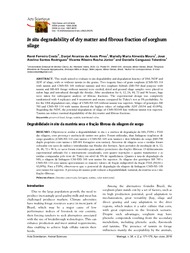In situ degradability of dry matter and fibrous fraction of sorghum silage.
In situ degradability of dry matter and fibrous fraction of sorghum silage.
Autoria: COSTA, R. F.; PIRES, D. A. de A.; MOURA, M. M. A.; RODRIGUES, J. A. S.; ROCHA JUNIOR, V. R.; TOLENTINO, D. C.
Resumo: This study aimed to evaluate in situ degradability and degradation kinetics of DM, NDF and ADF of silage, with or without tannin in the grains. Two isogenic lines of grain sorghum (CMS-XS 114 with tannin and CMS-XS 165 without tannin) and two sorghum hybrids (BR-700 dual purpose with tannin and BR-601 forage without tannin) were ensiled; dried and ground silage samples were placed in nylon bags and introduced through the fistulas. After incubation for 6, 12, 24, 48, 72 and 96 hours, bags were taken for subsequent analysis of fibrous fractions. The experimental design was completely randomized with 4 replicates and 4 treatments and means compared by Tukey’s test at 5% probability. As for the DM degradation rate, silage of CMSXS165without tannin was superior. Silages of genotypes BR700 and CMSXS 114 with tannin showed the highest values of indigestible ADF (59.54 and 43.09%). Regarding the NDF, the potential degradation of silage of CMSXS165 line without tannin was superior. Tannin can reduce ruminal degradability of the dry matter and fibrous fractions.
Ano de publicação: 2016
Tipo de publicação: Artigo de periódico
Unidade: Embrapa Milho e Sorgo
Palavras-chave: Alimento conservado, Forragem, Sorghum bicolor, Tanino, Valor nutricional
Observações
1 - Por padrão são exibidas publicações dos últimos 20 anos. Para encontrar publicações mais antigas, configure o filtro ano de publicação, colocando o ano a partir do qual você deseja encontrar publicações. O filtro está na coluna da esquerda na busca acima.
2 - Para ler algumas publicações da Embrapa (apenas as que estão em formato ePub), é necessário ter, no celular ou computador, um desses softwares gratuitos. Sistemas Android: Google Play Livros; IOS: iBooks; Windows e Linux: software Calibre.
Acesse outras publicações
Acesse a Base de Dados da Pesquisa Agropecuária (BDPA) para consultar o acervo completo das bibliotecas da Embrapa.

